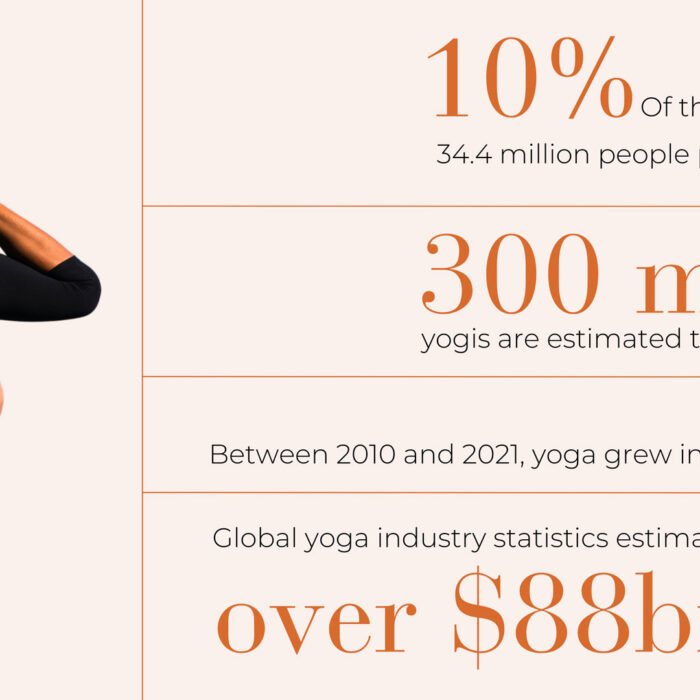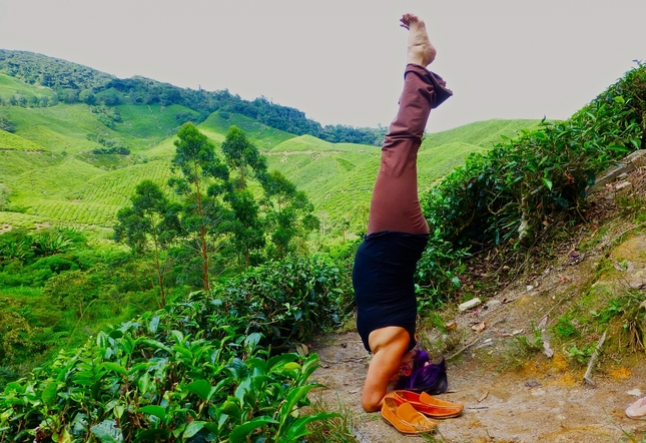the business of yoga

Yoga practice can be a lot of work, but the payoffs are worth the sweat. Your body feels amazing when yoga class ends. You’re starting to get that gleam in your eye. Your faith and discipline grow as natural rewards of your practice. You may be thinking you’re ready to quit your day job, become a yoga teacher, open a yoga studio, invent a yoga product and inspire others to feel as great as you feel!
is yoga also a business
Yes, tell everybody they need yoga, but you may want to keep your day job. Acting on faith has tremendous creative power, but make a plan before you invest your inheritance, risk your retirement savings, spend the kids’ college fund or take a second mortgage on the house. You can always keep your job and perform Seva, selfless service.
By donating your time, you can find out if a change is right for you. To be in the business of yoga, you want to find a way to make your passion for yoga pay your bills. Your values must align with your actions. Can you teach? Sell? Manage? Heal? Draw? Organize? Sing? Clean? All of these skills and more can be put to good use in the service of yoga.
Should you work for someone or be your own boss? Should you search for your niche or carve out a new market share for yourself? These decisions depend on how much risk you like to take. Here are some stories, encouraging yet cautionary, from people working within the many growing fields in the business of yoga.
“You should have your own business plan, especially if you are a sole practitioner business. How else can you manage your money and grow?” asks Art Tiddens, Ph.D., who facilitates a practical two-day intensive course called The Business of Yoga: How to Start and Grow Your Own Business, offered through the Forrest Yoga Circle.
He travels to major cities across the country and gives concrete guidance in comprehensive workshops where you write your own small business plan for yoga.
Lex Gillan, Director of the Yoga Institute and Bookstore in Houston is committed to the importance of one-on-one communication with students. He says, “Once you open a studio, it becomes 85% business and 15% teaching.” His Business of Yoga course covers many often-overlooked elements of running a yoga business.
A Business Asana course is also taught by Boston Yoga, a company providing yoga in corporate settings in Massachusetts. Course highlights include: marketing and promotions, initiating corporate yoga programs, developing negotiation skills, creating business opportunities, accounting strategies, and web page development.
In Los Angeles, SCORE Chapter 9 is a nonprofit organization of volunteer retired business people who provide free counseling and low-cost workshops. SCORE, the Service Corps of Retired Executives, a resource partner with the U.S. Small Business Administration, offers classes to help you start your own business. SCORE’s core values are exactly those most yoga businesses need: Client Focus, Delivering Quality, Ethical Conduct, Professionalism, and Contributing to the Community. If yoga and business can be done in line with these values, then the business of yoga will benefit everyone.
Stuart Hanna remembers witnessing how some studios did business and thinking, there’s got to be an easier way. “Because I had been thinking along those lines, Saul David Raye asked me to develop a software which would work more intuitively.” StudioWorks software was commissioned from the Sacred Movement Center for Yoga and Healing (now “Exhale”) in Venice and is now used in 40 other yoga studios.
Mara Trafficante is Stuart’s wife and partner. They own Mission Street Yoga in Pasadena, California, open for over 6 years. Stuart says, “We’ve been through the trenches, we’ve been through the ringer dealing with the real demands of launching and running a studio and not just postulating about what a studio owner might need. Most people out there who open yoga studios are like my wife and me, who opened our yoga studio without having been business owners.” Stuart uses his experience to improve StudioWorks, “It’s sort of like the racecar driver being able to design and build his race car.”
Justin White, a former Microsoft software developer founded Wellness Business Systems to provide the industry with business management software to improve business and free up time. Marketing director John Meyer says, “One of the things the Wellworks team did when we were at the LA Yoga Expo was hold two informal meetings on running a yoga studio. It was very interesting the number of women who love yoga and decided to open a yoga studio.
A problem many face is that once the business is running they end up spending more time running the business than focusing on their true passion, teaching Yoga.”
Stefan Storage hasn’t lost his passion, “I hope that people find this wonderful practice of yoga. I think it’s the greatest thing in the world.” The co-owner of the Garden of Yoga studio in Woodland Hills says, “When you start a studio, it’s definitely slow in the beginning, but it builds through advertising and word of mouth.”
He and his partner Diana Vega run classes strictly on donation basis to give complete pricing flexibility to students. “If it wasn’t for Bryan Kest‘s donation yoga, we would not have been able to continue a serious, ongoing, committed practice. So, we thought, we needed to take the same concept that worked for us and bring it to Garden of Yoga. We don’t want money to stop people from doing yoga.”
People don’t mind paying for yoga, though. We buy books, clothing, mats, instructional videos, and classes, all with cash, check or credit card. Where is the line between enough and too much? What about aparigraha? Doesn’t money make people greedy for more? Or are companies operating with an intention of integrity?
The Gaiam, Inc. website says their corporation understands, “that the opportunity to affect people’s lives with information and products is both a privilege and a responsibility.” Gaiam believes in the concept of “Conscious Commerce,” making purchasing decisions based on personal values and beliefs, taking into consideration all aspects of our lives and the impact we have upon the planet. Big business builds brand name loyalty, but big business is not without small consequences.
A year ago the company consolidated their operations, closing a Venice, CA office and moving all centralized functions to corporate headquarters in Broomfield, CO. “Conscious Commerce” should define the business of yoga and Frank Angiuli of Natural High Lifestyle is its champion. “We hope to be the thread that merges fashion, conscious living, and the health of our planet.” Frank believes smaller businesses can be models for larger manufacturers and his company demonstrates principles of sustainable economic and environmental business practice. He is just as passionate about his yoga practice.
You, too, love your yoga practice, but by now you may be saying, “Show me the money!” If you are a teacher, you may be able to pay the rent by privately teaching people who are too busy to attend classes or people with special injuries or needs. Laura Morgan of Topanga, a private yoga teacher for 8 years says, “I teach between seven and fourteen private sessions a week.” Her students come from referral and advertising, they schedule and pay at the beginning of each month. It’s not always easy, though, Laura says, “People get busy or sick or have emergencies.”
Dale Nieli, a personal trainer and private yoga teacher for 20 years, has a variety of clients, “Either I do a pro bodybuilder or someone with Parkinson’s disease.” What is her technique? “The biggest thing is humor.” When she teaches publicly, she says, “I prefer to teach at gyms and hotels. For a lot of people, it’s their introduction. I also love the marriage of weight training and yoga.” Whatever your passion, the business of yoga can be your outlet and provide you income.
A company may hire you if you write software and do yoga, especially if you can do them simultaneously. You may already work in an office. Why not a yoga studio office? Lamar Rutherford, C.P.A., M.B.A., is now Director of Marketing at Yoga Works. Her single owner studio, Yoga Time in Beverly Hills, recently became part of the seven locations of Yoga Works. As yoga’s popularity grows, mergers become a part of the business of yoga landscape. Lamar says, “We are excited about this opportunity for both our students and our teachers. Both will benefit from the ability to practice and teach yoga across all the Yoga Works studios.
At Strike A Balance, owner Jodi Timmons relates, “Some people like the intimacy of a yoga studio where we can offer more individual attention in a small group class.” She’s busy with all aspects of her studio’s operation. “At this point, most of the people walking in are new and I want to make a great first impression.” Jodi practices six days a week alongside her clients, great quality control for a studio owner. Practicing yoga can ease the stress of running your own business, so make sure you keep up your practice at the same time you’re keeping the books balanced.
Your yoga practice may even inspire a yoga-related business, like Yogitoes, based in Santa Monica. Founder Susan Nichols practices Astanga yoga and describes her invention, “It was created as a tool so I would no longer slip after many years of needing a towel that, when I looked in the market, didn’t exist.” Now, Yogitoes towels are sold in Arizona, California, Connecticut, Florida, Idaho, Nebraska, New York, and Texas. She says, “It’s been quite exciting and rewarding. We launched in stores last December and I’ve already sold out of my first inventory.”
You, too, may be able to create something of value to others and start your own business. Trish Sereda of Hotskins Bodywear in Venice explains, “Anything I make, I dream it up. I usually rebel against whatever style is happening.” Trish likes clothes that look and feel great on her. She values comfort and color and a good visual vibe, as well as manufacturing locally. “I believe in keeping all the money in the country. I do.”
Where can you earn some money from the business of yoga? Saul David Raye tells all the students in Sacred Movement’s teacher training courses, “You’re probably not going to make a lot of money and you’re probably not going to be very famous, but you can teach yoga if you come from your heart.” Since more and more teachers are being trained every month, the odds are good that you’ll have to teach for a while until yoga can sustain you financially. Saul says, “There are always new yoga students out there to go with the new yoga teachers.”
So, what can you do today to enter or improve the business of yoga? Write a business plan and trust that the yoga market is growing. “The people who need yoga the most are the ones who are most afraid and don’t know how to start.” relates Lou Volpano, CEO of Great Yoga Teachers, Inc. “We are trying to do a television show that can show people what a great teacher does.” He produces 30-minute TV segments in which several yoga teachers demonstrate and teach a single yoga pose for beginner, intermediate, and advanced level viewers, just as they might see in a class with one of these same teachers.
Maybe, one of these days, you could teach yoga on your own TV show! If you have some real estate in an exotic place, why not turn it into a yoga retreat destination? If your yacht is big enough, you could start your own yoga cruise line. Practically speaking, that extra room in your house could be the perfect yoga space, or you could clean out the garage to hold meditation sessions. The possibilities are endless. Be patient and persistent, you are bound to be successful.
Meditate on what your core values are. Truth? Peace? Community? Equality? Sustainability? The business world needs these! What would you spend money for in the yoga world? Remember, if you work in another field, even as a yoga student, when you spend your money, you contribute to the business of yoga. Make your living from your heart and as Frank Angiuli says, “Spend your money in line with your values.”



